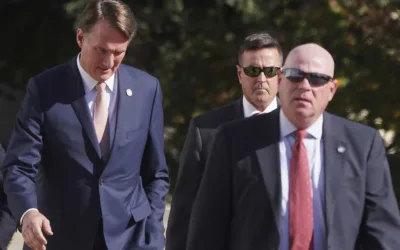The governing body for K-12 education in Virginia will review a proposal on Thursday to spend an additional $950 million on the state’s public schools.
The money is tied to changes that the Virginia Board of Education is recommending to reduce class sizes, hire more reading specialists, and eliminate a Recession-era cap on the number of support positions schools can employ.
“If these are passed, it will be because the [Board of Education] believes that this set of recommendations will move us down the path toward equitable outcomes for all of our children,” Daniel Gecker, the president of the board, told the Richmond Times-Dispatch.
An extra $950 million in recurring expenses would represent an 18% increase over the $5.36 billion the state spent on public education in 2017-18. Even if the Board approves the proposal, the General Assembly gets the final say in determining how much schools actually get.
In Virginia, state funding for K-12 schools has lagged behind pre-recession levels for over a decade, during which time Republicans have largely controlled the state legislature. Despite recent progress, without change state support will be down 9.1 percent per student for the 2018-2019 school year compared to 2008-2009, according to an analysis by The Commonwealth Institute.
School social workers, custodians and psychologists were among the first to get hit by the funding cuts, which remain in place. Though the economy has since rebounded, Virginia schools will receive $430 million less for support staff in the upcoming school year, compared to the 2008-2009 year, after adjusting for inflation.
School funding cuts have also contributed to deteriorating, unsanitary conditions in school buildings.
Teachers and parents at Sherwood Elementary in Norfolk have expressed concerns over insect and rodent infestations currently beleaguering the school. Five Chesterfield County schools have tested positive for the strain for Legionella bacteria that can cause Legionnaire’s disease. At George Washington Middle School in Alexandria, students had to take matters into their own hands and fight for mold-free classrooms. And in Richmond, Public Schools Superintendent Jason Kamras recently called Virginia school building conditions, “borderline criminal.”
As of 2013, 60 percent of Virginia schools were more than 40-years-old and the state estimated it would cost $18 billion to renovate all schools more than 30-years-old.
Democratic Gov. Ralph Northam proposed a minor uptick, $80 million, for new school construction last year, but the Republican-led General Assembly included less than half that amount in the current state budget.
Meanwhile, Virginia’s teachers are the third most underpaid in the nation compared to other college-educated workers, according to a report by the Economic Policy Institute, a liberal-leaning think tank.
While the report found that teachers in every state make less than their college-educated peers, Virginia’s numbers were particularly grim. The Commonwealth came in at 48th on the list, behind only Washington, where teachers make 31.6% less than their peers, and Arizona, where teachers make 32.6% less.
In the last four years, the weekly pay of Virginia teachers has fallen 31% behind the pay of other college-educated workers in the state.
Average salaries for all Virginia teachers are $8,483 less than the national average. The average starting salary for a Virginia teacher with a master’s degree is about $43,000.00 while their average starting debt is about $51,000.00.
Though state lawmakers did boost teacher pay by about five percent this year, it may be too little, too late. According to the nonprofit research group Learning Policy Institute, the turnover rate for Virginia K-12 educators is higher than 44 states and the District of Columbia.
The quality of education has also suffered since the Recession. RTD reports that last school year, more than 1 in 4 Virginia students weren’t reading on grade level by the end of third grade, the third year in a row the rate has declined.
Reading scores are down across the board, but the declines have been sharpest among black, Latinx, and economically disadvantaged students, contributing to a widening achievement gap.
Virginia Education Association President Jim Livingston told the RTD, “Virginia has balanced its budget on the backs of our children and that’s just wrong. Our children should be at the forefront of our state budget. It’s time to give them the resources they deserve.”

Here’s everything you need to know about this month’s Mercury retrograde
Does everything in your life feel a little more chaotic than usual? Or do you feel like misunderstandings are cropping up more frequently than they...

VIDEO: Check out Dogwood’s new merch line
Big news, Virginia! We've officially launched our Dogwood merch line 🎉 This year, we celebrate 5 years of bringing you Virginia news you can use....

VIDEO: Your support matters!
Your support matters! Donate today. @vadogwoodnews Your support matters! Visit our link in bio to donate today. #virginianews #virginia #community...

Op-Ed: Virginia’s new Democratic majorities pass key bills to improve your lives, but will Youngkin sign them?
The 2024 Virginia General Assembly regular session has wrapped up. It was a peculiar session from the outset, with Democratic majorities in the...

From the state rock to the state flower, here’s how Virginia got its symbols
Have you ever wondered why the Dogwood is the state flower? Or how the cardinal became the state bird? We’re here to answer those questions and more...

VIDEO: Second-gentleman Douglas Emhoff gives speech on reproductive freedom
Second gentleman, Douglas Emhoff touched on reproductive freedom not only being a woman's issue but "an everyone's issue" during the Biden-Harris...




